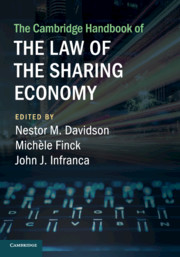20 results
Section 7 - Consumer Protection and Privacy Law
- from Part II - Addressing Specific Regulatory Concerns
-
- Book:
- The Cambridge Handbook of the Law of the Sharing Economy
- Published online:
- 12 November 2018
- Print publication:
- 22 November 2018, pp 395-446
-
- Chapter
- Export citation
Acknowledgments
-
- Book:
- The Cambridge Handbook of the Law of the Sharing Economy
- Published online:
- 12 November 2018
- Print publication:
- 22 November 2018, pp xxiii-xxiv
-
- Chapter
- Export citation
Part I - Understanding the Sharing Economy and Its Regulatory Landscape
-
- Book:
- The Cambridge Handbook of the Law of the Sharing Economy
- Published online:
- 12 November 2018
- Print publication:
- 22 November 2018, pp 9-286
-
- Chapter
- Export citation
Section 3 - Framing the Regulatory Response
- from Part I - Understanding the Sharing Economy and Its Regulatory Landscape
-
- Book:
- The Cambridge Handbook of the Law of the Sharing Economy
- Published online:
- 12 November 2018
- Print publication:
- 22 November 2018, pp 141-202
-
- Chapter
- Export citation
Section 4 - Who Should Regulate the Sharing Economy, and How?
- from Part I - Understanding the Sharing Economy and Its Regulatory Landscape
-
- Book:
- The Cambridge Handbook of the Law of the Sharing Economy
- Published online:
- 12 November 2018
- Print publication:
- 22 November 2018, pp 203-204
-
- Chapter
- Export citation
Contributors
-
- Book:
- The Cambridge Handbook of the Law of the Sharing Economy
- Published online:
- 12 November 2018
- Print publication:
- 22 November 2018, pp xv-xxii
-
- Chapter
- Export citation
Dedication
-
- Book:
- The Cambridge Handbook of the Law of the Sharing Economy
- Published online:
- 12 November 2018
- Print publication:
- 22 November 2018, pp v-vi
-
- Chapter
- Export citation
Introduction
-
- Book:
- The Cambridge Handbook of the Law of the Sharing Economy
- Published online:
- 12 November 2018
- Print publication:
- 22 November 2018, pp 1-8
-
- Chapter
- Export citation
15 - The Place of the Sharing Economy
- from Section 4 - Who Should Regulate the Sharing Economy, and How?
-
-
- Book:
- The Cambridge Handbook of the Law of the Sharing Economy
- Published online:
- 12 November 2018
- Print publication:
- 22 November 2018, pp 205-219
-
- Chapter
- Export citation
Section 8 - Anti-discrimination Law
- from Part II - Addressing Specific Regulatory Concerns
-
- Book:
- The Cambridge Handbook of the Law of the Sharing Economy
- Published online:
- 12 November 2018
- Print publication:
- 22 November 2018, pp 447-448
-
- Chapter
- Export citation
Part II - Addressing Specific Regulatory Concerns
-
- Book:
- The Cambridge Handbook of the Law of the Sharing Economy
- Published online:
- 12 November 2018
- Print publication:
- 22 November 2018, pp 287-288
-
- Chapter
- Export citation
Figures
-
- Book:
- The Cambridge Handbook of the Law of the Sharing Economy
- Published online:
- 12 November 2018
- Print publication:
- 22 November 2018, pp xi-xii
-
- Chapter
- Export citation
Contents
-
- Book:
- The Cambridge Handbook of the Law of the Sharing Economy
- Published online:
- 12 November 2018
- Print publication:
- 22 November 2018, pp vii-x
-
- Chapter
- Export citation
Section 2 - Balancing Regulation and Innovation
- from Part I - Understanding the Sharing Economy and Its Regulatory Landscape
-
- Book:
- The Cambridge Handbook of the Law of the Sharing Economy
- Published online:
- 12 November 2018
- Print publication:
- 22 November 2018, pp 65-140
-
- Chapter
- Export citation
Section 6 - Tax Law
- from Part II - Addressing Specific Regulatory Concerns
-
- Book:
- The Cambridge Handbook of the Law of the Sharing Economy
- Published online:
- 12 November 2018
- Print publication:
- 22 November 2018, pp 341-394
-
- Chapter
- Export citation
Tables
-
- Book:
- The Cambridge Handbook of the Law of the Sharing Economy
- Published online:
- 12 November 2018
- Print publication:
- 22 November 2018, pp xiii-xiv
-
- Chapter
- Export citation
Section 1 - What Is the Sharing Economy and Why Is It Important?
- from Part I - Understanding the Sharing Economy and Its Regulatory Landscape
-
- Book:
- The Cambridge Handbook of the Law of the Sharing Economy
- Published online:
- 12 November 2018
- Print publication:
- 22 November 2018, pp 11-64
-
- Chapter
- Export citation
Section 5 - Employment and Labor Law
- from Part II - Addressing Specific Regulatory Concerns
-
- Book:
- The Cambridge Handbook of the Law of the Sharing Economy
- Published online:
- 12 November 2018
- Print publication:
- 22 November 2018, pp 289-340
-
- Chapter
- Export citation
Copyright page
-
- Book:
- The Cambridge Handbook of the Law of the Sharing Economy
- Published online:
- 12 November 2018
- Print publication:
- 22 November 2018, pp iv-iv
-
- Chapter
- Export citation

The Cambridge Handbook of the Law of the Sharing Economy
-
- Published online:
- 12 November 2018
- Print publication:
- 22 November 2018



